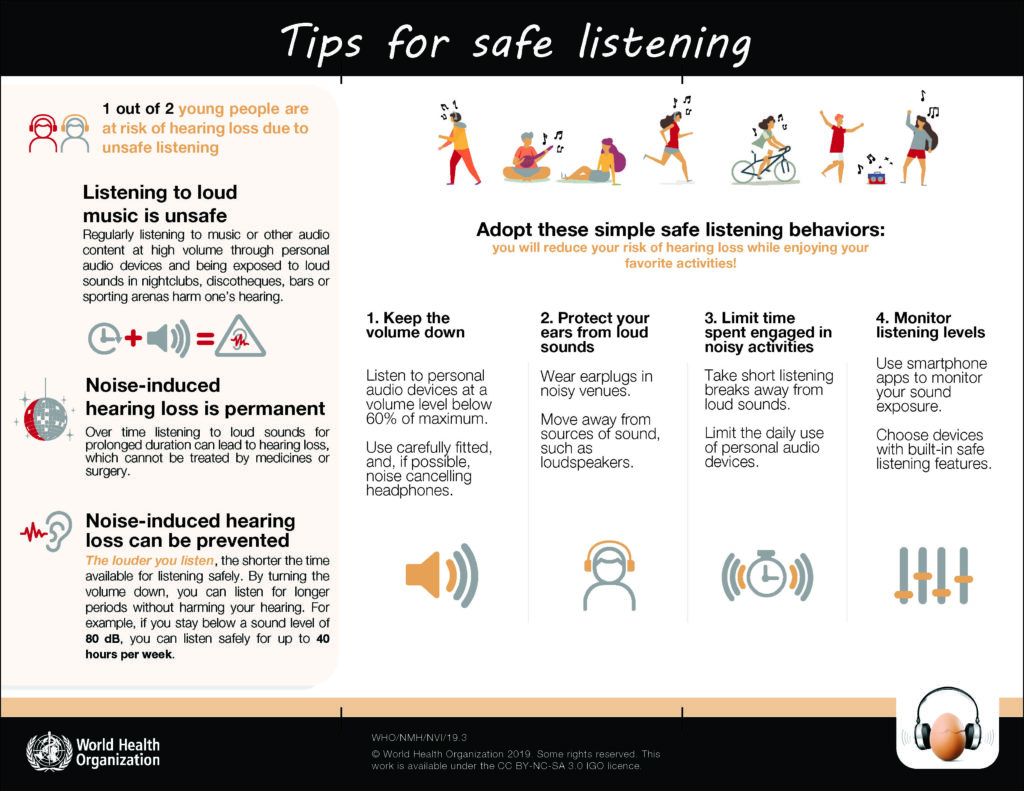Today is World Hearing Day 2022! A person is said to have hearing loss when they are not able to hear as well as someone with normal hearing (i.e. with hearing thresholds of 20 dB or higher). Hearing loss may be mild, moderate, severe, or profound. It can affect one ear or both ears, and may lead to difficulty in hearing conversational speech or loud sounds.
The term, “hard of hearing” refers to people with hearing loss ranging from mild to severe. People who are hard of hearing usually communicate through spoken language and can benefit from hearing aids, cochlear implants, and other devices, as well as captioning. Cochlear implants also benefit people who have more significant hearing loss.
People who are diagnosed as “deaf” mostly have profound hearing loss, which implies very little or no hearing. Deaf people often use sign
language for communication.
“Scare” stories such as “World Health Organisation forbids listening to music for more than 4 hours!” or “Don’t stay in a club for more than an hour,” are unhelpful and alarmist. No one needs to stop listening to the music they love, but everyone needs to be aware of the limits and practice of safe listening.
Impacts of Hearing Loss
When unaddressed, hearing loss impacts many aspects of life including:
Communication and speech
Unaddressed hearing loss affects the way people connect and communicate; this can have a profound effect on language development in children and hamper communication among adults.
Cognition
Language deprivation can lead to delayed cognitive development in children, which can be avoided if suitable intervention is received during the initial years of life. In older adults, unaddressed hearing loss is associated with mental and physical declines and with higher rates of age-related dementia.
Education and employment
In developing countries, children with hearing loss and deafness often do not receive schooling. Adults with hearing loss also have a much higher unemployment rate. Among those with hearing loss who are employed, a higher percentage are in lower grades of employment, earn lower wages, or retire earlier than their hearing peers.
Social and emotional
Although hearing loss contributes to social isolation and loneliness at all ages, these are experienced more specifically in people of older ages. The impaired ability to comprehend auditory information and maintain conversations may lead to avoidance of potentially embarrassing social situations. Lack of social engagement and loneliness, especially in older people, may further contribute to cognitive decline and depression.
Economic
Along with the distress experienced by individuals with hearing loss and the financial costs faced by families, WHO estimates that unaddressed hearing loss results in an annual global cost of 980 billion international dollars. This includes costs for the health sector (which exclude costs of hearing care such as hearing screening, hearing aids, implants or rehabilitation); costs of educational support; and costs resulting from loss of productivity.
How can hearing be protected?
Noise-induced hearing loss is irreversible. The good news is that it can be prevented through safe listening practices. The volume of sounds, the duration of listening, and frequency of exposure to loud sounds all have an impact on hearing. The higher the level of sound and longer the duration, the greater the risk of hearing loss.
Regular hearing checks are recommended – especially for those listening to music regularly or visiting loud entertainment venues. The hearWHO screening app can be used to check and track hearing status and to seek professional advice if a hearing test is failed.
Learn more at who.int/campaigns/world-hearing-day


